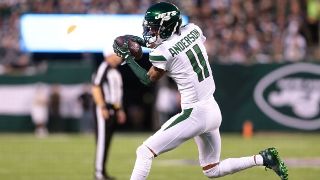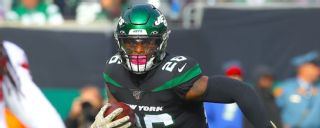|
First-year general manager Joe Douglas provided a glimpse into his roster-building strategy at the midseason trading deadline in October, making only one deal (adios, Leonard Williams) and resisting the urge to hold an "I'll show 'em who's boss" fire sale. His job is about to get a lot more complicated. Heading into his first offseason with the New York Jets, Douglas faces a handful of delicate personnel decisions: Does he trade a fan favorite who might seek a record-breaking contract? Does he cut bait with a declining star even if it means eating millions in salary? Does he play hardball with an ascending wide receiver? A few thoughts on how Douglas should tackle these issues:
Trade Le'Veon BellHe is due to make $13.5 million (fully guaranteed) in 2020, and Bell most certainly isn't a $13.5 million player, but the Jets are stuck between a (running) back and a hard place. They can't cut him because the cap hit is prohibitive ($19 million), and the only way to trade him is to pay a chunk of his salary. How much they pay would dictate how much return they get in a trade, but the best-case scenario is a fourth-round pick, one rival executive predicted. A 28-year-old runner (next season) with a monster contract and a 3.3-yard average isn't going to spark a bidding war. (He ranks 45th out of 46 qualified runners in yards per carry.) Maybe Bell would agree to renegotiate to facilitate a trade? A middle-round pick isn't a great haul for a former All-Pro, but a trade is the way to go if the financials make sense. The Jets could save a few million in salary, reinvest it to address other needs and draft a replacement at running back. Coach Adam Gase didn't want Bell in the first place because he prefers a "committee" backfield instead of having a high-priced feature back, but he was overruled by former GM Mike Maccagnan. My hunch is he will push for a trade. The ultimate decision belongs to Douglas, who has final say on the roster. Douglas, hired in June, has no allegiance to Bell. Has Gase maximized Bell's talent? No, but he's not an ideal scheme fit, especially on outside zone plays. There's also some concern about Bell's previously injured knee and his overall commitment to conditioning. Bottom line: He's a solid player with a bad contract, and the Jets should look to improve the situation. An artificial deadline is March 15, when a $2 million roster bonus (guaranteed) is due. Prediction: Bell will be playing football (and bowling) in another city in the fall.
Don't trade Jamal Adams unless offered the moonThe safety is the Jets' best player, he's 24 years old and he's under contract for two more years (counting a team option in 2021). Seems like a no-brainer, right? Well, it got a little messy around the trading deadline, when multiple teams expressed interest in Adams and the Jets listened to offers. That didn't sit well with Adams, who had a temper tantrum. His relationship with management appears to have been repaired, but those same teams likely will renew their interest in the offseason. That, coupled with Adams' likely desire to become the NFL's highest-paid safety, will fuel trade speculation. Don't do it. Adams is a game-changing player, just reaching the prime of his career. Make no mistake, $15 million a year is a lot for a strong safety -- that's what it would cost to put him atop the position -- but it's wiser to spend on a homegrown star than throw stupid money at free agents with reported motivation issues (yes, looking at you, Trumaine Johnson). "He's the heart and soul of [the defense]," Gase said. "Guys elevate their play when he's out there." Douglas is on record as saying he wants to keep Adams, but he also said he will always listen if a team calls. He reportedly was seeking a first-round pick and two second-rounders at the October deadline. If a team drafting in the top 20 is willing to pay that much, Douglas has to consider it for the good of the organization. Draft capital is important for a team with so many needs. Any package short of that wouldn't make sense. Prediction: Adams will be back with a new contract.
 Don't overpay for Robby AndersonEligible for free agency, the wide receiver has bolstered his stock with a late-season surge (24 catches, 402 yards and three touchdowns in five games), but this isn't a cut-and-dried decision because of the potential cost. Anderson is expected to seek a contract that will pay him at least $14 million a year, which would put him in the top 15 among wide receivers. The Jets are justifiably hesitant to go that high. While he has made nice strides in recent weeks, demonstrating a willingness to fight for contested balls, Anderson hasn't elevated himself to the point where he deserves to be paid like a star. He's never had a 1,000-yard season, he's not a red zone threat and he's a slow starter. There's also some concern about his off-the-field habits, even though he has stayed out of trouble for nearly two years. The Jets are interested in re-signing Anderson, a solid WR2, but they would be stretching if they meet his price. Plus, this is a strong wide-receiver draft, with ESPN draft analyst Todd McShay projecting six in the first 20 picks. You hate to lose a player such as Anderson, who has provided some electrifying moments over the years, but it's important to focus on the big picture. The Jets are ranked 32nd in total offense with him; they couldn't do worse without him. Prediction: Anderson will sign with his hometown Miami Dolphins, where he will reunite with former receivers coach Karl Dorrell.
|

